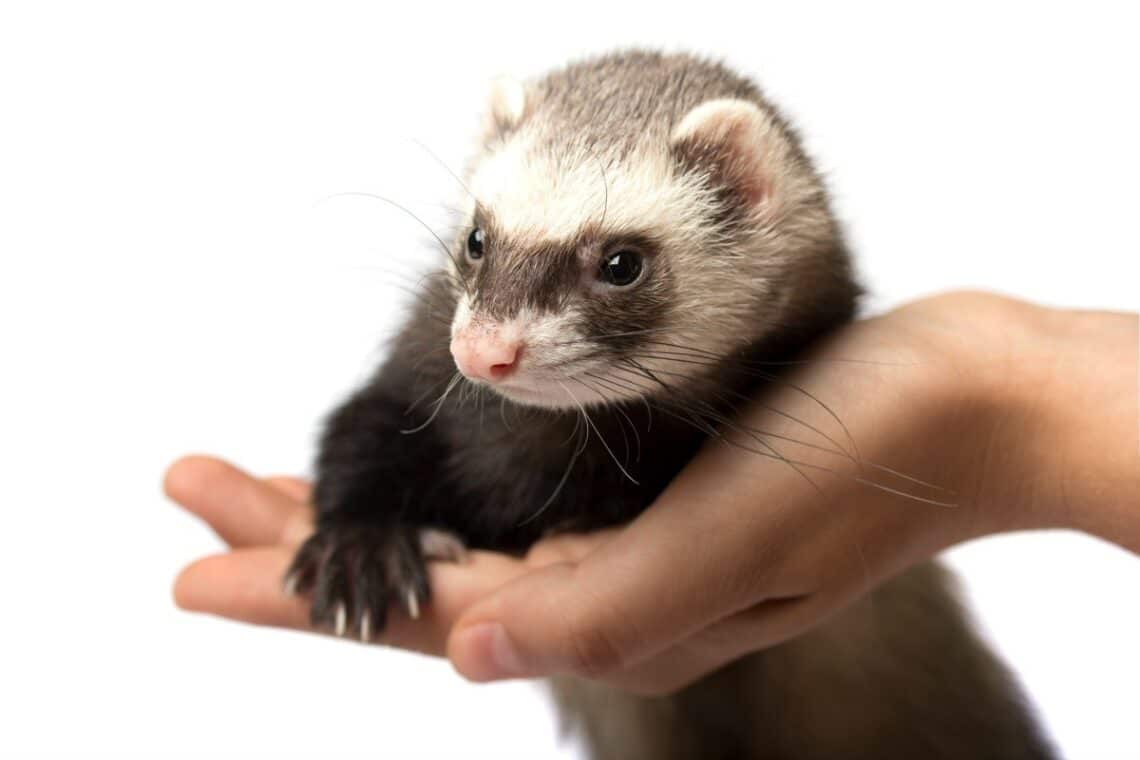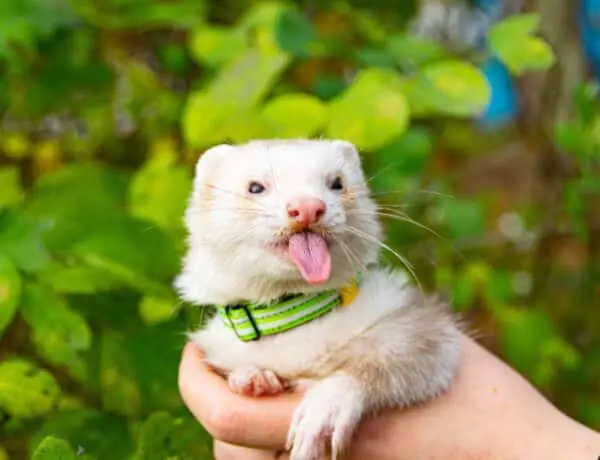Introduction
Can Ferrets Be Service Animals: Service animals play a vital role in the lives of individuals with disabilities, providing invaluable assistance and support to help them lead more independent and fulfilling lives. While dogs are perhaps the most well-known and widely used service animals, there is an ongoing debate and curiosity about the suitability of other animals for such roles. One such creature that has garnered attention in this context is the ferret. Ferrets bite, known for their playful and curious nature, may not be the first animal that comes to mind when thinking of service animals, but their potential for service roles has sparked interest and discussion among those seeking alternative solutions for individuals with specific needs. To answer this, we will consider the unique characteristics of ferrets, the legal aspects surrounding service animals, and the practical challenges and benefits they may offer in comparison to more traditional service animals like dogs.
The use of service animals has evolved over time to accommodate various disabilities and conditions, including physical, sensory, and even emotional support needs. While dogs are exceptionally well-suited for these roles due to their trainable nature, loyalty, and adaptability, there are circumstances where different animals might be considered. Ferrets, with their small size and inquisitive personalities, might be seen as potential candidates. To determine the suitability of ferrets as service animals, it’s essential to delve into the specific requirements and responsibilities that service animals fulfill. These animals are trained to assist individuals with disabilities, such as guiding the visually impaired, alerting the deaf, providing mobility assistance, or even offering emotional support for those with psychiatric conditions.
In this examination, we will explore the various facets of ferret service animals, considering factors such as their trainability, temperament, and the challenges they might present in different service contexts. Moreover, we will delve into the legal framework surrounding service animals and the regulations that govern their use to determine whether ferrets can legally assume such roles. Finally, we will weigh the practical advantages and disadvantages of employing ferrets as service animals, comparing them to the more traditional service animal options. By addressing these crucial aspects, we hope to shed light on the potential of ferrets to serve as valuable service animals and contribute to the ongoing discourse on expanding the possibilities for individuals with disabilities to lead more independent and fulfilling lives.

Are ferrets good for depression?
Yes absolutely. Ferrets qualify as emotional support animals. They don’t require any training, unlike service animals. Emotional support ferrets provide companionship to an individual who suffers from a mental or emotional condition like depression, anxiety, PTSD, etc.
Ferrets are known for their affectionate and social nature. They thrive on interaction and bonding with their owners. This companionship can be incredibly valuable for individuals battling depression, as it offers a source of emotional connection and reduces feelings of loneliness and isolation. The simple act of caring for and playing with a ferret can provide a sense of purpose and routine, which can be particularly beneficial for those dealing with depressive symptoms.
Interacting with pets, including ferrets, has been shown to trigger the release of oxytocin and reduce stress hormones like cortisol. Spending time with these playful creatures can help individuals with depression relax, lower their anxiety levels, and experience moments of joy. Ferrets’ curious and mischievous behavior can also bring laughter and amusement, effectively diverting attention from depressive thoughts and worries.
Depression often saps one’s motivation and energy, making it challenging to engage in regular physical activity. Ferrets, being active and inquisitive animals, require daily exercise and mental stimulation. Taking care of a ferret involves creating a structured daily routine that includes playtime, feeding, and cleaning their enclosure. This routine can motivate individuals to get out of bed and engage in physical activity, which is known to have a positive impact on mood and overall well-being.
One of the key benefits of pet ownership, including ferrets, is the non-judgmental and unconditional love they offer. Individuals with depression often grapple with feelings of guilt, shame, or inadequacy. A ferret’s affectionate presence can create a safe and accepting space where people can be themselves without fear of criticism or rejection.
Are ferrets good for your mental health?
Ferrets can also be emotional support animals.
According to Emotional Pet Support, “These creatures are small, friendly, quiet, social, personable, and litter-trained! They’re also incredibly easy to carry around with you and they don’t get stressed out with moving around all day and not being able to go outside much.”
Ferrets are inherently social animals that thrive on companionship and interaction. Their playful and affectionate nature makes them excellent companions for individuals seeking emotional support and connection. Interacting with ferrets can help combat feelings of loneliness and isolation, which are often associated with poor mental health. The bond formed between a ferret and its owner can provide a sense of comfort and reduce the negative impact of stress and anxiety.
The act of spending time with a ferret can trigger the release of feel-good hormones such as oxytocin and dopamine. This can lead to reduced stress levels and an improved overall mood. The playful antics of ferrets can be entertaining and serve as a distraction from daily worries, allowing individuals to unwind and relax. Petting and cuddling with a ferret can have a calming effect, which is particularly beneficial for individuals dealing with stress and anxiety disorders.
Ferrets require a structured daily routine, including feeding, cleaning, and playtime. For individuals struggling with mental health issues, this routine can provide a sense of purpose and structure to their day. The responsibilities of caring for a ferret can motivate individuals to get out of bed, engage in daily tasks, and establish a regular routine—a crucial component of managing mental health.
One of the remarkable aspects of pet ownership is the unconditional love and acceptance pets offer. Ferrets, in particular, do not judge their owners and provide a safe, non-judgmental space where individuals can express themselves without fear of criticism. This support can be invaluable for those coping with depression, anxiety, or other mental health challenges.
Do ferrets have anxiety?
Other symptoms of anxiety in your ferret may include depression, loss of appetite, hiding or aggression. Some simple planning will help prevent your ferret from becoming stressed by a complete change in his environment. One of the first things to do is to check with the animal control office at your new home.
Ferrets are charming and playful creatures, known for their boundless curiosity and energetic antics. However, like any living beings, ferrets can also experience a range of emotions, including anxiety. Understanding the factors that contribute to ferret anxiety and learning how to recognize and address it is crucial for responsible ferret ownership. In this article, we will explore the concept of anxiety in ferrets, its potential causes, and some strategies to help alleviate their stress and promote their well-being.
Ferrets are highly social animals, and they thrive on interaction with other ferrets and humans. Isolation or lack of companionship can lead to anxiety and loneliness in ferrets.
Ferrets can be sensitive to changes in their environment. Moving to a new home, rearranging their living space, or introducing new pets can all be stress-inducing for ferrets.
Ferrets, like all animals, can experience anxiety for various reasons. Recognizing the signs of anxiety and understanding its potential causes is essential for responsible ferret ownership. By providing companionship, a stimulating environment, and a routine that promotes security, you can help ensure your ferret’s emotional well-being and create a happier, more content pet.
Is milk OK for ferrets?
DAIRY PRODUCTS
Your ferret may love ice-cream, milk, and cheese but these should be avoided. Ferrets are carnivores and are supposed to eat meat protein, they are not designed to process dairy proteins. In particular, Ferrets lack the enzyme required to digest lactose, a little like lactose intolerant humans.
Ferrets are curious and playful pets known for their distinctive dietary needs. When it comes to what they should or should not consume, it’s crucial for ferret owners to be aware of their nutritional requirements to ensure their furry friends’ well-being. One common question that arises is whether milk is suitable for ferrets. In this article, we will explore the suitability of milk for ferrets and provide insights into their dietary needs.
Like many mammals, ferrets are born with the ability to digest lactose, a sugar found in milk. However, as they mature, many ferrets lose this ability, becoming lactose intolerant. Lactose intolerance means that their bodies can no longer produce enough of the enzyme lactase, which is necessary to break down lactose into digestible components.
If you want to provide your ferret with a dairy-like treat, it’s advisable to opt for lactose-free options specifically formulated for ferrets. These products are designed to mimic the taste and texture of milk without the lactose content that can be harmful to them.
Do ferrets love owners?
While ferrets are not for everyone, they can make great pets for the right owner. They are affectionate and bond with their owners, quiet for a large part of the day, and there are few pets as playful as ferrets.
Social Animals: Ferrets are inherently social creatures. In the wild, they live in groups, and this social nature extends to their relationships with humans. When raised in a loving and nurturing environment, ferrets often develop deep attachments to their owners.
Affectionate Behavior: Ferrets display various affectionate behaviors towards their owners. They may groom their human’s hands or face, playfully nip (known as “dooking”), or seek out physical closeness through cuddling or resting on their owners’ laps.
Recognition: Ferrets can recognize their owners through scent, sight, and sound. They often respond with excitement and joy when their favorite human is around, which indicates a level of attachment.
Play and Interaction: Ferrets thrive on play and interaction, and they often initiate games with their owners. This engagement demonstrates their desire for companionship and emotional connection.
Are ferrets loyal pets?
A pet ferret can be one of the most loyal, cuddly, and loving pets available but could also be one of the most finicky. With a shorter lifespan of just 8 to 10 years, it is recommended that ferrets be spayed or neutered to prevent major health risks that would shorten their lives even more.
Ferrets are charismatic and endearing creatures that have garnered a dedicated following of enthusiasts who cherish them as beloved pets. One of the questions that frequently arises when considering ferrets as pets is whether they exhibit loyalty akin to that of dogs or cats. In this article, we will explore the concept of loyalty in ferrets and discuss the nature of the bond that can develop between these playful creatures and their human caregivers.
Ferrets are social animals by nature, and they thrive on interaction with both their fellow ferrets and their human companions. When properly cared for and nurtured, ferrets have the capacity to form deep and affectionate bonds with their owners. This bond may not always manifest in ways similar to the loyalty often associated with dogs, but it is undoubtedly present and meaningful in its own unique way.
Ferrets often display their attachment and loyalty through play. They engage in interactive games with their owners, such as chase and hide-and-seek, as a way to strengthen their bond. Some ferrets enjoy cuddling with their owners, whether it’s nestled in a lap, snuggled into clothing, or nestled against a person’s neck or shoulder. This physical closeness demonstrates their trust and comfort in the owner’s presence.
Ferrets may follow their owners around the house, participate in daily activities, and even steal objects like socks or keys as a way of seeking attention and interaction. Ferrets may make distinctive vocalizations, including dooking and chirping, to express their happiness and excitement when they’re with their owners.
Are ferrets loyal?
Ferrets are very inquisitive, very curious, very active pets and even a munchkin that can tend to get into trouble from time to time. With that being said, ferrets are very loyal, playful, and can easily be a pet that you can form a very strong bond with.
Ferrets are small, curious, and highly social creatures known for their playful and energetic nature. As popular pets, they often capture the hearts of their owners with their charming antics and unique personalities. While loyalty in pets is often associated with animals like dogs, ferrets, too, exhibit loyalty in their own distinctive way. In this article, we will explore the concept of loyalty in ferrets and shed light on the nature of their attachment to their human companions.
Ferrets are inherently social animals that thrive on interaction and companionship. When provided with proper care, attention, and nurturing, they have the capacity to form deep and affectionate bonds with their human owners. These bonds may not always manifest in the same overtly loyal behaviors seen in dogs, but they are undoubtedly present and meaningful.
It’s crucial to understand that the loyalty and attachment ferrets form with their owners may differ from the loyalty often associated with dogs. Ferrets have their individual personalities, and the way they express loyalty centers around play, companionship, and the joy of being with their human caregivers. Their loyalty is often marked by affectionate behaviors that bring joy and fulfillment to the lives of those who share their homes with these spirited creatures.
What animal is best for emotional support?
Dogs. The most common type of service animals, dogs can provide a wide spectrum of support for anyone living with a mental health disorder. As an ESA, a canine companion provides support and comfort to individuals dealing with mental and emotional disabilities.
Emotional support animals (ESAs) play a crucial role in helping individuals cope with mental health challenges. They provide companionship, comfort, and a sense of purpose to those who rely on them for emotional support. While the term “emotional support animal” isn’t limited to specific species, some animals are better suited for this role than others. The choice of the best animal for emotional support varies from person to person and depends on individual preferences, needs, and circumstances.
Dogs are one of the most popular choices for emotional support animals. They are known for their loyalty, unconditional love, and ability to sense and respond to their owner’s emotions.
Cats are independent but can be deeply affectionate and comforting companions. Their calming presence and purring can provide emotional relief.
Rabbits are gentle, quiet animals that can form strong bonds with their owners. Their soft fur and calm demeanor can be soothing.

Conclusion
While ferrets emotional possess certain characteristics that may make them appealing candidates, such as their small size and curiosity, several challenges must be considered. First and foremost, the effectiveness of a service animal depends on its ability to perform specific tasks reliably and consistently. Ferrets may lack the trainability and predictability that dogs offer, which are essential qualities for service animals. Additionally, their inherent nature as predators might pose safety concerns in certain situations. From a legal perspective, the regulations surrounding service animals primarily recognize dogs and, in some cases, miniature horses as legitimate service animals.
This legal framework does not currently encompass ferrets, which could lead to complications when it comes to accessing public spaces and accommodations. Practical considerations also come into play. Ferrets, like any service animal, require proper care, socialization, and training. Their unique needs and behaviors may require specialized expertise that is not readily available. While it is essential to remain open to innovative solutions for individuals with disabilities, including exploring alternative service animals, the current consensus leans heavily towards the use of dogs for service roles. The well-established training programs, legal recognition, and the dog’s remarkable adaptability make them the preferred choice.
In the end, while the concept of ferrets as service animals is intriguing, it presents considerable challenges in terms of trainability, legal recognition, and practicality. As we continue to explore new ways to support individuals with disabilities, it is crucial to prioritize the welfare and effectiveness of service animals while adhering to established legal frameworks. For the time being, dogs remain the primary and most reliable choice for service animal roles. While the idea of expanding the range of service animal options is a noble one, it is crucial to prioritize the well-being and effectiveness of the service animal in assisting individuals with disabilities. This includes considering factors like the animal’s health, safety, and the reliability of their performance in various service tasks.





No Comments